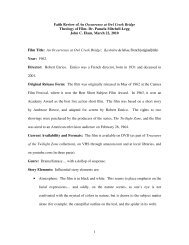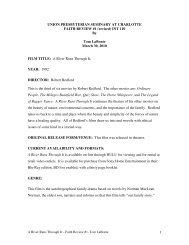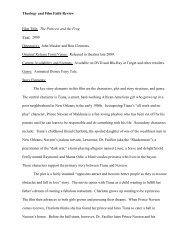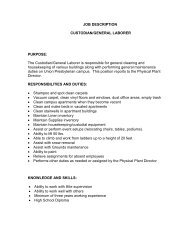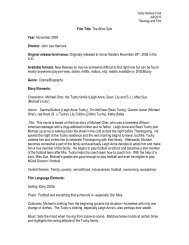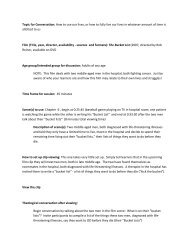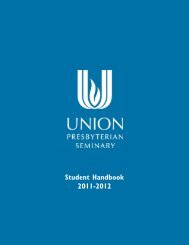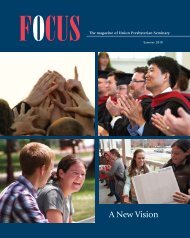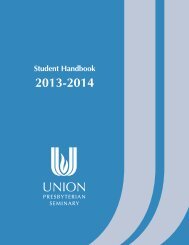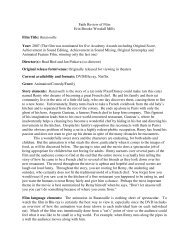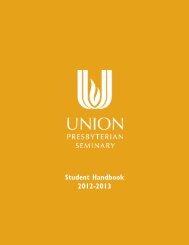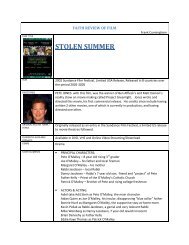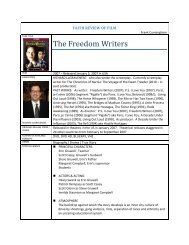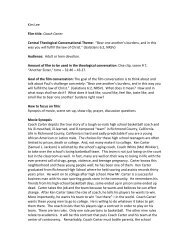Academic Catalog 2010-2011 - Union Presbyterian Seminary
Academic Catalog 2010-2011 - Union Presbyterian Seminary
Academic Catalog 2010-2011 - Union Presbyterian Seminary
You also want an ePaper? Increase the reach of your titles
YUMPU automatically turns print PDFs into web optimized ePapers that Google loves.
<strong>Union</strong> <strong>Presbyterian</strong> <strong>Seminary</strong> <strong>Academic</strong> <strong>Catalog</strong> <strong>2010</strong>-<strong>2011</strong>consider the ways in which these Christians viewed both God and the creation and the means by which theypracticed and proclaimed their faith. The course is open to students of all degree programs.TBA.COURSESHST123/623 Jonathan Edwards. This course probes the life and writings of Jonathan Edwards (1703-1758), the New England preacher and writer who combined Calvinist ideas with evangelical faith, and Puritannotions of ministry with Enlightenment culture and rhetoric. We will discuss, in a seminar setting, readingsfrom Edwards, including major treatises (e.g., Religious Affections, Freedom of the Will, or History of the Workof Redemption), sermons, and private notebooks.January <strong>2011</strong>.HST128 World Religions of Asia. This course introduces the beliefs, traditions, and practices of religionsoriginating in India, China, and Japan: Hinduism, Buddhism, Jainism, Sikhism, Confucianism, Taoism, andShinto. Emphasis will be given to the sacred writings of each of these religions and their influence on the currentscene in North America.TBA.HST129 The <strong>Presbyterian</strong> Heritage. This course traces the faith and development of <strong>Presbyterian</strong> churches,giving particular emphasis to the traditions of the <strong>Presbyterian</strong> Church (USA). It focuses on <strong>Presbyterian</strong> historyand Reformed confessions, and it identifies a <strong>Presbyterian</strong> “culture” which, despite changes over the centuries,retains distinctive characteristics. The goals of this course are (1) to gain a basic knowledge of <strong>Presbyterian</strong> history;(2) to study the movement of <strong>Presbyterian</strong> theology across time in the United States setting; (3) to understandthe contexts out of which the Book of Order and Book of Confessions of the <strong>Presbyterian</strong> Church (USA)were formed; and (4) to identify the instincts and proclivities of the <strong>Presbyterian</strong>/Reformed ecclesiastical culture.TBA.HST130 Secularism and Religious Belief. This course explores the historical origins and contemporarybeliefs underlying secularism as a cultural, social, and political phenomenon in the modern west. Taking its cuefrom Charles Taylor’s “Secularism,” the course examines philosophical arguments against a providential andspiritual worldview (e.g., David Hume), the rise of non-religious political systems, and contemporary versions ofsecularism, from economic and social to scientific and artistic cultures. The course also will provide opportunitiesto reflect on Christian responses.TBA.HST133 Existential Christianity in the Modern West. This course introduces students to an influentialstrain of Protestantism in the modern West, which might be called Existential Christianity. Touching on Augustineand taking Luther as a starting point, it focuses on Kierkegaard, Bonhoeffer, and a recent theologian (changingeach term) in that line of religious reflection. The course centers on primary texts as it probes for thetheological and social critiques articulated by these thinkers.TBA.HST145/645 Evangelical Protestantism in American History. This course analyzes the development andgrowth of evangelicalism within major Protestant movements, including the Reformed tradition in Americanhistory. Beginning with the revivals of the mid-eighteenth century, it covers the meaning of evangelicalism as ittook shape through the early national period, post-bellum America, through the mid-twentieth century to thecurrent scene of megachurches, neo-Calvinism, and the fractured evangelical order. It examines key primarytexts in their social, cultural, and intellectual contexts. Throughout, we will discuss especially the relationshipamong established Protestant churches, changes in theological argument and persuasion, and innovations in religiouspractice.Fall <strong>2010</strong>.3-12



